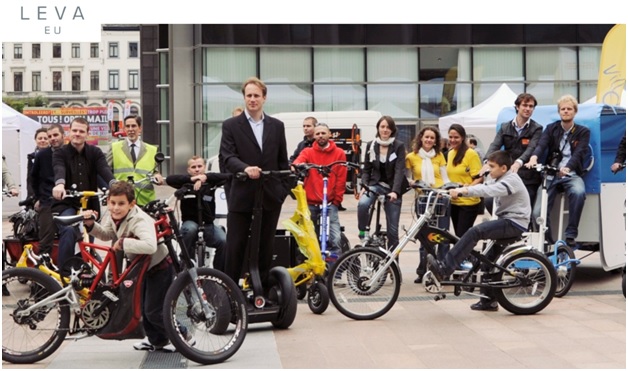LEVA-EU recently published a press release concerning the request to the Dutch government withdrawing national LEV requirements. The Minister of Infrastructure and Water Management yielded a proposal to the House of Representatives calling for an introduction of specific requirements for Light Electric Vehicles. LEVA-EU, the trade association in Europe which works exclusively for LEVs, reviewed the proposal and determined that it breaches EU legislation.
The proposal concerns a variety of LEVs ranging from electric cargo cycles, e-scooters, and self-balancing vehicles with steering wheels, such as segways or hoverboards. It states that self-balancing transport without steering wheels, like motorized monowheels or electric skateboards, would continue to be prohibited on public roads. The proposal separates vehicles into four separate categories: the first e-cargo cycles that are less than 55 ( <55.) The second category is all other LEVs also less than 55 kg ( <55). The third category is LEVs for
cargo transport, greater than 55 kg (>55). And lastly, LEVs for passenger transport, also greater than 55 kg (>55 kg.) In each category, there is a separate proposal for the requirements for approval and surveillance along with additional road admission for road use.
The first category, e-cargo cycles that are less than 55, has no notable changes except for a limit on width, which for cargo cycles is 1 meter. However, for the second, third, and fourth categories mentioned above, there will be an approval and surveillance procedure introduced, assigned to RDW. Allowing the RDW to make rules, inspect vehicles, and also act as supervisors, giving RDW full discretion. This decision, pointed out by LEVA-EU, does not seem to be consistent with a normal democratic process.
Furthermore, RDW has since created technical requirements for categories two through four, which will be presented on Thursday, September 30th at a stakeholders meeting. It should be noted, however, that vehicles in the first category are allowed on the road without further approval. Regardless of the exception within the first category of LEVs, LEVA-EU concluded from their analysis that the trade association for business concerning the LEV-sector, that the Dutch government's proposal to certain LEVs, besides Regulation 168/2013, is a breach of EU legislation.
The government stated that “These vehicles cannot be admitted to road traffic following other European regulations, which thus means that they are implicitly prohibited.” However, LEVA-EU challenges this notion, stating that similar to e-bikes, electric cargo cycles, electric scooters, and self-balancing vehicles are excluded from Regulation 168/2013, they too are subject to the Machinery-, EMC and RoHS-Directive. LEVA-EU requests the Dutch government to withdraw their notion and to waive the LEV Approval Framework. Also, LEVA-EU requests the government to stop denying or barricading access to public roads for all LEV's that meet the current requirements of the Machine, EMC, and RoHS Directives. The request also applies to self-balancing vehicles and those without steering wheels.
For further details involving LEVA-EU's dismissal of the Dutch government's regulation, their website offers insightful information and LEVA-EU's full position concerning the matter.








